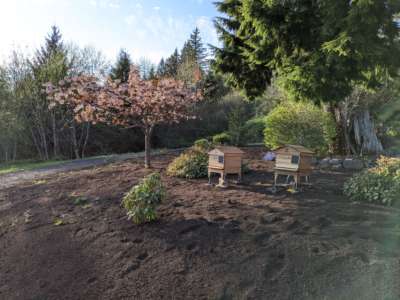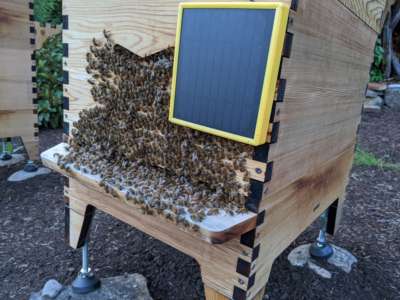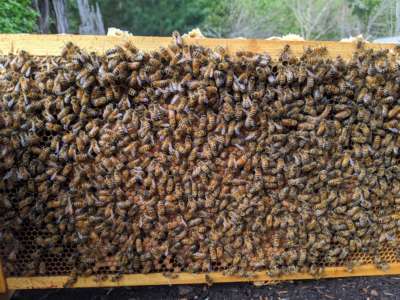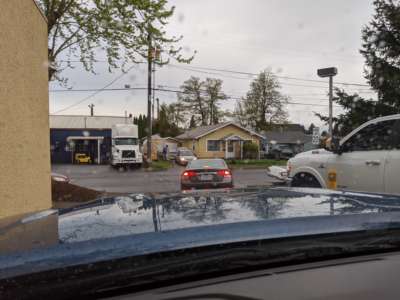
In Spring of 2020, I decided I wanted to start keeping bees. It’s something I’ve had curiosity to do for some time, but hadn’t really been in the position to comfortably pursue it. It’s fair to call it a hobby, as the goal isn’t an industrial scale honey production - more trying to enjoy a modest harvest, learn more about how bees live, and provide some consistent pollinators for the nearby farmers in our valley.
Updates
I’ll keep adding updates in the log section as things progress, but this is the over-view. Check back for more!
Hives
I decided to start with just two hives, and figured that would be enough to try this all out, and also see how it goes. After a lot of looking, I settled on starting out with the FlowHive 2 hives in cedar. Pricy, but also seemed to have the combination of things I wanted to start with in the beginning to try out, and also I do appreciate the ingenious honey harvesting methods, which also match my desire to minimally harvest honey, and primarily worry about learning to keep bees.
I also because I couldn’t help myself, love playing with sensors and technology to monitor things in the real world. I decided with the hardware I had on hand to try to build and use the Open Source osbeehives.com monitoring device to collect things like temperature, humidity, sound levels and frequency, and generally get some insight into what is happening inside the hive without opening it up. The photon chip and sensor system gets power from an outside power solar panel, seen in the photo below.

The data from the mobile app looks like this: Hive 1 & Hive 2
Bees

So beehives, equipment, and all that doesn’t get anyone very far without some bees! - Here we were, one car at a time picking up our NUC packages, containing several frames of bees that has established from bridgetownbees which were sourced from local apiaries in the area with survivor stock bees that had been adapted to our local area namely; Old Sol Apiaries and Foot Hills Honey. They are awesome to work with, though with Coronavirus in full swing, we didn’t get the normal time to talk, and pick out species of bees. I got a more ‘random’ selection!

I believe I got a population of Apis Mellifera Carnica and a second Apis Mellifera Liguistica colony for a total of two types. I’ll see how they each fair, and if they both survive we’ll go from there!
Learning
Starting bees is ideally a “low-contact-sport” so beginning beekeeping during the Corona virus in 2020 made it different, but still doable. What was lacking was the abundant chances to have in person guidance, or mentoring, though I found a next best thing were the growing number of excellent youtube resources covering so many topics. I left a few examples below, and please check them out to learn more! And of course, almost everywhere you are will have local bees association, so check out your local group to find others to work with.
Youtube Channels
Frederick Dunn - The Way to BeeGreat weekly content with Q&A, fair and broad coverage with lots of personal experience backed by research.
The HoneysteadApproachable and excellent content. I particularly like to watch this channel because it’s someone from my general area, and we may share some basic concerns. If you find someone in your local area, or a similar weather climate, that could be key to learn what techniques are more applicable for your area.
Don The Fat Bee ManA great example of old knowledge, and helps me understand some of differences in warm climate vs northern climate beekeeping as this person operates in the southern USA. Very educational, and covers a wide range of topics from a more commercial beekeeper perspective, which also helps me contrast large scale vs small scale beekeeping.
Green Toe GardensKim Flottum: Ten Rules for Modern Beekeeping - a great primer, and worth the watch that covers a number of topics, and also is a great idea for why attending bee keeping classes can be extremely helpful, as they can contain content like this, and a real chance to learn.
Treatment-Free BeekeepingA longer presentation, coverers a lot of topics concerning treating bees for illness, and talks through options for natural vs chemical remedies.